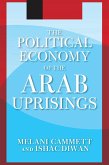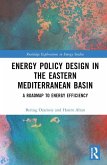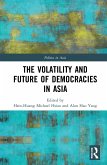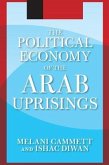The Future of Political Science
100 Perspectives
Herausgeber: King, Gary; Nie, Norman; Schlozman, Kay L.
The Future of Political Science
100 Perspectives
Herausgeber: King, Gary; Nie, Norman; Schlozman, Kay L.
- Gebundenes Buch
- Merkliste
- Auf die Merkliste
- Bewerten Bewerten
- Teilen
- Produkt teilen
- Produkterinnerung
- Produkterinnerung
This book contains some of the newest, most exciting ideas now percolating within political science. One hundred authors each contribute a brief essay about a single novel or insufficiently appreciated idea on some aspect of political science.
Andere Kunden interessierten sich auch für
![The Development of Political Science The Development of Political Science]() David Easton / Luigi Graziano / John Gunnell (eds.)The Development of Political Science260,99 €
David Easton / Luigi Graziano / John Gunnell (eds.)The Development of Political Science260,99 €![The Political Economy of the Arab Uprisings The Political Economy of the Arab Uprisings]() Melani CammettThe Political Economy of the Arab Uprisings194,99 €
Melani CammettThe Political Economy of the Arab Uprisings194,99 €![Energy Policy Design in the Eastern Mediterranean Basin Energy Policy Design in the Eastern Mediterranean Basin]() Bertug OzarisoyEnergy Policy Design in the Eastern Mediterranean Basin197,99 €
Bertug OzarisoyEnergy Policy Design in the Eastern Mediterranean Basin197,99 €![The Volatility and Future of Democracies in Asia The Volatility and Future of Democracies in Asia]() The Volatility and Future of Democracies in Asia195,99 €
The Volatility and Future of Democracies in Asia195,99 €![The Future of International Relations The Future of International Relations]() Ole Waever (ed.)The Future of International Relations206,99 €
Ole Waever (ed.)The Future of International Relations206,99 €![The Political Economy of the Arab Uprisings The Political Economy of the Arab Uprisings]() Melani CammettThe Political Economy of the Arab Uprisings56,99 €
Melani CammettThe Political Economy of the Arab Uprisings56,99 €![The Funding of Political Parties The Funding of Political Parties]() The Funding of Political Parties206,99 €
The Funding of Political Parties206,99 €-
-
-
This book contains some of the newest, most exciting ideas now percolating within political science. One hundred authors each contribute a brief essay about a single novel or insufficiently appreciated idea on some aspect of political science.
Hinweis: Dieser Artikel kann nur an eine deutsche Lieferadresse ausgeliefert werden.
Hinweis: Dieser Artikel kann nur an eine deutsche Lieferadresse ausgeliefert werden.
Produktdetails
- Produktdetails
- Verlag: Routledge
- Seitenzahl: 304
- Erscheinungstermin: 23. März 2009
- Englisch
- Abmessung: 235mm x 157mm x 21mm
- Gewicht: 594g
- ISBN-13: 9780415997003
- ISBN-10: 0415997003
- Artikelnr.: 25934338
- Herstellerkennzeichnung
- Libri GmbH
- Europaallee 1
- 36244 Bad Hersfeld
- gpsr@libri.de
- Verlag: Routledge
- Seitenzahl: 304
- Erscheinungstermin: 23. März 2009
- Englisch
- Abmessung: 235mm x 157mm x 21mm
- Gewicht: 594g
- ISBN-13: 9780415997003
- ISBN-10: 0415997003
- Artikelnr.: 25934338
- Herstellerkennzeichnung
- Libri GmbH
- Europaallee 1
- 36244 Bad Hersfeld
- gpsr@libri.de
Gary King is David Florence Professor of Government at Harvard University. Kay Lehman Schlozman is J. Joseph Moakley Professor of Political Science at Boston College. Norman Nie is Research Professor of Political Science at Stanford University and Professor Emeritus at University of Chicago.
Introduction 1. The United States: A Different Democracy
Arend Lijphart 2. Taking Portraits or Group Photos?
Russell Dalton 3. Why Political Theorists Should Think More Carefully About Leadership
Nannerl O. Keohane 4. The Leadership Gap
Mark A. Peterson 5. Instrumental Value of Elite Memories on Past Violence during the Emergence of a New State: Slovenian Experience
Anton Kramberger
Ana Barbic and Katja Boh 6. Politicians are People
too
Philip Edward Jones 7 . Elite Tough Talk and the Tides of History
Henry E. Brady 8. Representation as a Field of Study
Barry C. Burden 9. Political Science: What Should We Know?
David Butler 10. Dynamic Categories and the Context of Power
Jane Junn 11. Politics as Learning
Hugh Heclo 12. Rounding Up the Activists
Kent Jennings 13. The Troubling Persistence of Injustice
Michael L. Frazer 14. Making a Name for Oneself
Harvey Mansfield 15. Political Variation across Contexts
Michael Jones-Correa 16. Homo Politicus is Not an Island
Claudine Gay 17. The Sociological Bases of Political Preferences and Behavior
Casey A. Klofstad 18. Community Social Capital
Kristi Andersen 19. Tuned In
But Dropped Out
Carole Jean Uhlaner 20. Cognition
Emotion and Selectivity in Political Communication in a Multi-Facetted World
Rational Choice and Political Culture
Robert H. Bates 21. Who Wants War?
Ann Sartori 22. The Threat to Democracy
Lawrence R. Jacobs 23. Nationalist Missions and the Democratic Citizen
Katherine Tate 24. Something's Going On Here
but We Don't Know What It Is: Measuring Citizens' Exposure to Politically-Relevant Information in the New Media Environment
Michael X. Delli Carpini 25. What We Still Need to Know Why and How People Become Committed Democrats
Philip Oxhorn 26. When We Could Do So Much Better: Democratic Commitment and Empirical Political Psychology
by Virginia Sapiro 27. Political Science and the Future
James Q. Wilson 28. Family Matters
David E. Campbell 29. Where do the Premises of Political Choice Come From?
Daniel Carpenter 30. Immigration
Partisanship and Electoral Change
Norman H. Nie 31. Decisions People Make in Small Groups
John Aldrich 32. Why Do (Some) People Acquire Costly Political Knowledge?
Torben Iversen 33. A Political View of Political Ideology
John Zaller 34. Guess What? Voters are Smart
Gerald Pomper 35. Extra! Extra! Extra Info Needed with Survey Reporting
Andrea Louise Campbell 36. What Should Journalists and Politicians Know? Beyond the Margin of Error
Morris P. Fiorina 37. The Need for Survey Reporting Standards in Political Science
D. Sunshine Hillygus 38. The Changing Evidence Base of Political Science Research
Gary King 39. FMRI and Public Opinion Research
Ikua Kabashima 40. Special Interest Politics
Jeffry A. Frieden 41. An Ever Fainter Voice
Jeffrey M. Berry 42. Exploring Political Inequality
Benjamin I. Page 43. Voice
and Then What?
Larry M. Bartels 44. The Impact of Unequal Political Participation on Policy Outcome
Eric Schickler 45. Participation Matters
Jan Leighley 46. Participatory Distortion ($$) Takes Off!!
Philip Converse 47. The Rashomon World of Money and Politics
Thomas E. Mann 48. Does Rising Economic Inequality Matter
Christopher Jencks 49. Redistribution without Representation and Representation without Redistribution
James E. Alt 50. The Ideological Origins of Redistribution
Eric Nelson 51. Reuniting Interests and Values
David C. Leege 52. Using Research to Foster Democracy
Ken Stehlik-Berry 53. "Moral Convictions
Religion
and Diversity: Our Political Atmosphere
William C. McCready 54. Equality and Inclusiveness
Diversity and Conflict
John R. Petrocik 55. The End of 'the Protestant Nation'
Byron Shafer 56. The Political Force of Group Consciousness
Bill Schneider 57. Going Global: New challenges and opportunities in research on democratic participation and the civic culture
Pippa Norris 58. The Effects of Immigration and Sending Countries Outreach on American Public Opinion and Political Behavior
Rodolfo O. de La Garza 59. Exorcising Huntingtonian Specters
Ary Zolberg 60. Adding-in Sex Discrimination to Legacies of Wrongdoing
Eileen McDonaugh 61. Gender Inequality
Nancy Burns 62. Gender Differences as the Basis for a Refoundation of the Social Sciences: The Political Integration of Women: Explaining Women's Slow Advancement into Political Office
Michelle Swers 63. Is American Becoming a More Class-Based Society?
Robert Putnam 64. The NAACP Nobody Knows
Richard Vallelly 65. At the Intersection of Inequalities
Shauna L. Shames 66. The Professional Campaign
Ganesh Sitamaran 67. What Politicians Actually Can do: A Modest Proposal for Reporting on Campaigns
Daniel Schlozman 68. Elections: Five Rules for Commentators
John Mark Hansen 69. Negative Ads
Cynical Public?
Arthur Sanders 70. Independent Electoral Commissions
Nahomi Ichino 71. Watch Out! The Units You are Comparing May Not be What They Used to be!
Philippe C. Schmitter 72. Don't Stay Home: The Utility of Area Studies for Political Science Scholarship
by Jorge I. Dominguez 73. Can We Really be Happy with the Study of Comparative Government?
Hans Daalder 74. The Contingent Flaw of Majoritarian Systems
G. Bingham Powell
Jr. 75. Religion and Politics
Goldie Shabad 76. Study China!
Roderick MacFarquhar 77. Soft Power and the Future of Asia
by Lucian Pye 78. The Study of International Law
by Jens Meierhenrich 79. The Second Image Reversed Revisited
Robert Keohane 80. The Globalization Gap
James Rosenau 81. Congress and the Scope of Democracy
Ira Katznelson 82. 'Free Association': Traveling Ideas and the Study of Political Equality
Nancy Rosenblum 83. To Participate or Deliberate -is that the Question?
Dennis F. Thompson 84. Understanding Democracy as a Complex Adaptive System
Louise K.Comfort 85. The Public Roots of Private Action: A New Look at Voting Costs
Susan B. Hansen 86. On the Free Rider Problem
Jane Mansbridge 87. Time and Action in the 21st Century
Anya Bernstein 88. The Organizational 'Gap' in Political Science
Joseph LaPalombara 89. The Sudden Birth of Sticky Institutions
1890-1915
Gerald Gamm 90. The Emerging Field of Education Policy
Paul Peterson 91. American Politics and the Not-So-Benign Neglect of Criminal Justice
Traci Burch 92. Law or Politics?
H. W. Perry
Jr. 93. What is Public Policy?
Catherine E. Rudder 94. Note to Politicians: Forget the Silver Bullet!
Kay Lehman Schlozman 95. Rediscovering Complexity and Synthesis
Bear F. Braumoeller 96. Why?
Kenneth A. Shepsle 97. Path Dependence
Peter A. Hall 98. Searching for a Politics of Space
Jennifer Hochschild 99. The Question of Relevance
Joseph S. Nye
Jr. 100. Can (Should) Political Science be a Policy Science?
Kenneth Prewitt
Arend Lijphart 2. Taking Portraits or Group Photos?
Russell Dalton 3. Why Political Theorists Should Think More Carefully About Leadership
Nannerl O. Keohane 4. The Leadership Gap
Mark A. Peterson 5. Instrumental Value of Elite Memories on Past Violence during the Emergence of a New State: Slovenian Experience
Anton Kramberger
Ana Barbic and Katja Boh 6. Politicians are People
too
Philip Edward Jones 7 . Elite Tough Talk and the Tides of History
Henry E. Brady 8. Representation as a Field of Study
Barry C. Burden 9. Political Science: What Should We Know?
David Butler 10. Dynamic Categories and the Context of Power
Jane Junn 11. Politics as Learning
Hugh Heclo 12. Rounding Up the Activists
Kent Jennings 13. The Troubling Persistence of Injustice
Michael L. Frazer 14. Making a Name for Oneself
Harvey Mansfield 15. Political Variation across Contexts
Michael Jones-Correa 16. Homo Politicus is Not an Island
Claudine Gay 17. The Sociological Bases of Political Preferences and Behavior
Casey A. Klofstad 18. Community Social Capital
Kristi Andersen 19. Tuned In
But Dropped Out
Carole Jean Uhlaner 20. Cognition
Emotion and Selectivity in Political Communication in a Multi-Facetted World
Rational Choice and Political Culture
Robert H. Bates 21. Who Wants War?
Ann Sartori 22. The Threat to Democracy
Lawrence R. Jacobs 23. Nationalist Missions and the Democratic Citizen
Katherine Tate 24. Something's Going On Here
but We Don't Know What It Is: Measuring Citizens' Exposure to Politically-Relevant Information in the New Media Environment
Michael X. Delli Carpini 25. What We Still Need to Know Why and How People Become Committed Democrats
Philip Oxhorn 26. When We Could Do So Much Better: Democratic Commitment and Empirical Political Psychology
by Virginia Sapiro 27. Political Science and the Future
James Q. Wilson 28. Family Matters
David E. Campbell 29. Where do the Premises of Political Choice Come From?
Daniel Carpenter 30. Immigration
Partisanship and Electoral Change
Norman H. Nie 31. Decisions People Make in Small Groups
John Aldrich 32. Why Do (Some) People Acquire Costly Political Knowledge?
Torben Iversen 33. A Political View of Political Ideology
John Zaller 34. Guess What? Voters are Smart
Gerald Pomper 35. Extra! Extra! Extra Info Needed with Survey Reporting
Andrea Louise Campbell 36. What Should Journalists and Politicians Know? Beyond the Margin of Error
Morris P. Fiorina 37. The Need for Survey Reporting Standards in Political Science
D. Sunshine Hillygus 38. The Changing Evidence Base of Political Science Research
Gary King 39. FMRI and Public Opinion Research
Ikua Kabashima 40. Special Interest Politics
Jeffry A. Frieden 41. An Ever Fainter Voice
Jeffrey M. Berry 42. Exploring Political Inequality
Benjamin I. Page 43. Voice
and Then What?
Larry M. Bartels 44. The Impact of Unequal Political Participation on Policy Outcome
Eric Schickler 45. Participation Matters
Jan Leighley 46. Participatory Distortion ($$) Takes Off!!
Philip Converse 47. The Rashomon World of Money and Politics
Thomas E. Mann 48. Does Rising Economic Inequality Matter
Christopher Jencks 49. Redistribution without Representation and Representation without Redistribution
James E. Alt 50. The Ideological Origins of Redistribution
Eric Nelson 51. Reuniting Interests and Values
David C. Leege 52. Using Research to Foster Democracy
Ken Stehlik-Berry 53. "Moral Convictions
Religion
and Diversity: Our Political Atmosphere
William C. McCready 54. Equality and Inclusiveness
Diversity and Conflict
John R. Petrocik 55. The End of 'the Protestant Nation'
Byron Shafer 56. The Political Force of Group Consciousness
Bill Schneider 57. Going Global: New challenges and opportunities in research on democratic participation and the civic culture
Pippa Norris 58. The Effects of Immigration and Sending Countries Outreach on American Public Opinion and Political Behavior
Rodolfo O. de La Garza 59. Exorcising Huntingtonian Specters
Ary Zolberg 60. Adding-in Sex Discrimination to Legacies of Wrongdoing
Eileen McDonaugh 61. Gender Inequality
Nancy Burns 62. Gender Differences as the Basis for a Refoundation of the Social Sciences: The Political Integration of Women: Explaining Women's Slow Advancement into Political Office
Michelle Swers 63. Is American Becoming a More Class-Based Society?
Robert Putnam 64. The NAACP Nobody Knows
Richard Vallelly 65. At the Intersection of Inequalities
Shauna L. Shames 66. The Professional Campaign
Ganesh Sitamaran 67. What Politicians Actually Can do: A Modest Proposal for Reporting on Campaigns
Daniel Schlozman 68. Elections: Five Rules for Commentators
John Mark Hansen 69. Negative Ads
Cynical Public?
Arthur Sanders 70. Independent Electoral Commissions
Nahomi Ichino 71. Watch Out! The Units You are Comparing May Not be What They Used to be!
Philippe C. Schmitter 72. Don't Stay Home: The Utility of Area Studies for Political Science Scholarship
by Jorge I. Dominguez 73. Can We Really be Happy with the Study of Comparative Government?
Hans Daalder 74. The Contingent Flaw of Majoritarian Systems
G. Bingham Powell
Jr. 75. Religion and Politics
Goldie Shabad 76. Study China!
Roderick MacFarquhar 77. Soft Power and the Future of Asia
by Lucian Pye 78. The Study of International Law
by Jens Meierhenrich 79. The Second Image Reversed Revisited
Robert Keohane 80. The Globalization Gap
James Rosenau 81. Congress and the Scope of Democracy
Ira Katznelson 82. 'Free Association': Traveling Ideas and the Study of Political Equality
Nancy Rosenblum 83. To Participate or Deliberate -is that the Question?
Dennis F. Thompson 84. Understanding Democracy as a Complex Adaptive System
Louise K.Comfort 85. The Public Roots of Private Action: A New Look at Voting Costs
Susan B. Hansen 86. On the Free Rider Problem
Jane Mansbridge 87. Time and Action in the 21st Century
Anya Bernstein 88. The Organizational 'Gap' in Political Science
Joseph LaPalombara 89. The Sudden Birth of Sticky Institutions
1890-1915
Gerald Gamm 90. The Emerging Field of Education Policy
Paul Peterson 91. American Politics and the Not-So-Benign Neglect of Criminal Justice
Traci Burch 92. Law or Politics?
H. W. Perry
Jr. 93. What is Public Policy?
Catherine E. Rudder 94. Note to Politicians: Forget the Silver Bullet!
Kay Lehman Schlozman 95. Rediscovering Complexity and Synthesis
Bear F. Braumoeller 96. Why?
Kenneth A. Shepsle 97. Path Dependence
Peter A. Hall 98. Searching for a Politics of Space
Jennifer Hochschild 99. The Question of Relevance
Joseph S. Nye
Jr. 100. Can (Should) Political Science be a Policy Science?
Kenneth Prewitt
Introduction 1. The United States: A Different Democracy
Arend Lijphart 2. Taking Portraits or Group Photos?
Russell Dalton 3. Why Political Theorists Should Think More Carefully About Leadership
Nannerl O. Keohane 4. The Leadership Gap
Mark A. Peterson 5. Instrumental Value of Elite Memories on Past Violence during the Emergence of a New State: Slovenian Experience
Anton Kramberger
Ana Barbic and Katja Boh 6. Politicians are People
too
Philip Edward Jones 7 . Elite Tough Talk and the Tides of History
Henry E. Brady 8. Representation as a Field of Study
Barry C. Burden 9. Political Science: What Should We Know?
David Butler 10. Dynamic Categories and the Context of Power
Jane Junn 11. Politics as Learning
Hugh Heclo 12. Rounding Up the Activists
Kent Jennings 13. The Troubling Persistence of Injustice
Michael L. Frazer 14. Making a Name for Oneself
Harvey Mansfield 15. Political Variation across Contexts
Michael Jones-Correa 16. Homo Politicus is Not an Island
Claudine Gay 17. The Sociological Bases of Political Preferences and Behavior
Casey A. Klofstad 18. Community Social Capital
Kristi Andersen 19. Tuned In
But Dropped Out
Carole Jean Uhlaner 20. Cognition
Emotion and Selectivity in Political Communication in a Multi-Facetted World
Rational Choice and Political Culture
Robert H. Bates 21. Who Wants War?
Ann Sartori 22. The Threat to Democracy
Lawrence R. Jacobs 23. Nationalist Missions and the Democratic Citizen
Katherine Tate 24. Something's Going On Here
but We Don't Know What It Is: Measuring Citizens' Exposure to Politically-Relevant Information in the New Media Environment
Michael X. Delli Carpini 25. What We Still Need to Know Why and How People Become Committed Democrats
Philip Oxhorn 26. When We Could Do So Much Better: Democratic Commitment and Empirical Political Psychology
by Virginia Sapiro 27. Political Science and the Future
James Q. Wilson 28. Family Matters
David E. Campbell 29. Where do the Premises of Political Choice Come From?
Daniel Carpenter 30. Immigration
Partisanship and Electoral Change
Norman H. Nie 31. Decisions People Make in Small Groups
John Aldrich 32. Why Do (Some) People Acquire Costly Political Knowledge?
Torben Iversen 33. A Political View of Political Ideology
John Zaller 34. Guess What? Voters are Smart
Gerald Pomper 35. Extra! Extra! Extra Info Needed with Survey Reporting
Andrea Louise Campbell 36. What Should Journalists and Politicians Know? Beyond the Margin of Error
Morris P. Fiorina 37. The Need for Survey Reporting Standards in Political Science
D. Sunshine Hillygus 38. The Changing Evidence Base of Political Science Research
Gary King 39. FMRI and Public Opinion Research
Ikua Kabashima 40. Special Interest Politics
Jeffry A. Frieden 41. An Ever Fainter Voice
Jeffrey M. Berry 42. Exploring Political Inequality
Benjamin I. Page 43. Voice
and Then What?
Larry M. Bartels 44. The Impact of Unequal Political Participation on Policy Outcome
Eric Schickler 45. Participation Matters
Jan Leighley 46. Participatory Distortion ($$) Takes Off!!
Philip Converse 47. The Rashomon World of Money and Politics
Thomas E. Mann 48. Does Rising Economic Inequality Matter
Christopher Jencks 49. Redistribution without Representation and Representation without Redistribution
James E. Alt 50. The Ideological Origins of Redistribution
Eric Nelson 51. Reuniting Interests and Values
David C. Leege 52. Using Research to Foster Democracy
Ken Stehlik-Berry 53. "Moral Convictions
Religion
and Diversity: Our Political Atmosphere
William C. McCready 54. Equality and Inclusiveness
Diversity and Conflict
John R. Petrocik 55. The End of 'the Protestant Nation'
Byron Shafer 56. The Political Force of Group Consciousness
Bill Schneider 57. Going Global: New challenges and opportunities in research on democratic participation and the civic culture
Pippa Norris 58. The Effects of Immigration and Sending Countries Outreach on American Public Opinion and Political Behavior
Rodolfo O. de La Garza 59. Exorcising Huntingtonian Specters
Ary Zolberg 60. Adding-in Sex Discrimination to Legacies of Wrongdoing
Eileen McDonaugh 61. Gender Inequality
Nancy Burns 62. Gender Differences as the Basis for a Refoundation of the Social Sciences: The Political Integration of Women: Explaining Women's Slow Advancement into Political Office
Michelle Swers 63. Is American Becoming a More Class-Based Society?
Robert Putnam 64. The NAACP Nobody Knows
Richard Vallelly 65. At the Intersection of Inequalities
Shauna L. Shames 66. The Professional Campaign
Ganesh Sitamaran 67. What Politicians Actually Can do: A Modest Proposal for Reporting on Campaigns
Daniel Schlozman 68. Elections: Five Rules for Commentators
John Mark Hansen 69. Negative Ads
Cynical Public?
Arthur Sanders 70. Independent Electoral Commissions
Nahomi Ichino 71. Watch Out! The Units You are Comparing May Not be What They Used to be!
Philippe C. Schmitter 72. Don't Stay Home: The Utility of Area Studies for Political Science Scholarship
by Jorge I. Dominguez 73. Can We Really be Happy with the Study of Comparative Government?
Hans Daalder 74. The Contingent Flaw of Majoritarian Systems
G. Bingham Powell
Jr. 75. Religion and Politics
Goldie Shabad 76. Study China!
Roderick MacFarquhar 77. Soft Power and the Future of Asia
by Lucian Pye 78. The Study of International Law
by Jens Meierhenrich 79. The Second Image Reversed Revisited
Robert Keohane 80. The Globalization Gap
James Rosenau 81. Congress and the Scope of Democracy
Ira Katznelson 82. 'Free Association': Traveling Ideas and the Study of Political Equality
Nancy Rosenblum 83. To Participate or Deliberate -is that the Question?
Dennis F. Thompson 84. Understanding Democracy as a Complex Adaptive System
Louise K.Comfort 85. The Public Roots of Private Action: A New Look at Voting Costs
Susan B. Hansen 86. On the Free Rider Problem
Jane Mansbridge 87. Time and Action in the 21st Century
Anya Bernstein 88. The Organizational 'Gap' in Political Science
Joseph LaPalombara 89. The Sudden Birth of Sticky Institutions
1890-1915
Gerald Gamm 90. The Emerging Field of Education Policy
Paul Peterson 91. American Politics and the Not-So-Benign Neglect of Criminal Justice
Traci Burch 92. Law or Politics?
H. W. Perry
Jr. 93. What is Public Policy?
Catherine E. Rudder 94. Note to Politicians: Forget the Silver Bullet!
Kay Lehman Schlozman 95. Rediscovering Complexity and Synthesis
Bear F. Braumoeller 96. Why?
Kenneth A. Shepsle 97. Path Dependence
Peter A. Hall 98. Searching for a Politics of Space
Jennifer Hochschild 99. The Question of Relevance
Joseph S. Nye
Jr. 100. Can (Should) Political Science be a Policy Science?
Kenneth Prewitt
Arend Lijphart 2. Taking Portraits or Group Photos?
Russell Dalton 3. Why Political Theorists Should Think More Carefully About Leadership
Nannerl O. Keohane 4. The Leadership Gap
Mark A. Peterson 5. Instrumental Value of Elite Memories on Past Violence during the Emergence of a New State: Slovenian Experience
Anton Kramberger
Ana Barbic and Katja Boh 6. Politicians are People
too
Philip Edward Jones 7 . Elite Tough Talk and the Tides of History
Henry E. Brady 8. Representation as a Field of Study
Barry C. Burden 9. Political Science: What Should We Know?
David Butler 10. Dynamic Categories and the Context of Power
Jane Junn 11. Politics as Learning
Hugh Heclo 12. Rounding Up the Activists
Kent Jennings 13. The Troubling Persistence of Injustice
Michael L. Frazer 14. Making a Name for Oneself
Harvey Mansfield 15. Political Variation across Contexts
Michael Jones-Correa 16. Homo Politicus is Not an Island
Claudine Gay 17. The Sociological Bases of Political Preferences and Behavior
Casey A. Klofstad 18. Community Social Capital
Kristi Andersen 19. Tuned In
But Dropped Out
Carole Jean Uhlaner 20. Cognition
Emotion and Selectivity in Political Communication in a Multi-Facetted World
Rational Choice and Political Culture
Robert H. Bates 21. Who Wants War?
Ann Sartori 22. The Threat to Democracy
Lawrence R. Jacobs 23. Nationalist Missions and the Democratic Citizen
Katherine Tate 24. Something's Going On Here
but We Don't Know What It Is: Measuring Citizens' Exposure to Politically-Relevant Information in the New Media Environment
Michael X. Delli Carpini 25. What We Still Need to Know Why and How People Become Committed Democrats
Philip Oxhorn 26. When We Could Do So Much Better: Democratic Commitment and Empirical Political Psychology
by Virginia Sapiro 27. Political Science and the Future
James Q. Wilson 28. Family Matters
David E. Campbell 29. Where do the Premises of Political Choice Come From?
Daniel Carpenter 30. Immigration
Partisanship and Electoral Change
Norman H. Nie 31. Decisions People Make in Small Groups
John Aldrich 32. Why Do (Some) People Acquire Costly Political Knowledge?
Torben Iversen 33. A Political View of Political Ideology
John Zaller 34. Guess What? Voters are Smart
Gerald Pomper 35. Extra! Extra! Extra Info Needed with Survey Reporting
Andrea Louise Campbell 36. What Should Journalists and Politicians Know? Beyond the Margin of Error
Morris P. Fiorina 37. The Need for Survey Reporting Standards in Political Science
D. Sunshine Hillygus 38. The Changing Evidence Base of Political Science Research
Gary King 39. FMRI and Public Opinion Research
Ikua Kabashima 40. Special Interest Politics
Jeffry A. Frieden 41. An Ever Fainter Voice
Jeffrey M. Berry 42. Exploring Political Inequality
Benjamin I. Page 43. Voice
and Then What?
Larry M. Bartels 44. The Impact of Unequal Political Participation on Policy Outcome
Eric Schickler 45. Participation Matters
Jan Leighley 46. Participatory Distortion ($$) Takes Off!!
Philip Converse 47. The Rashomon World of Money and Politics
Thomas E. Mann 48. Does Rising Economic Inequality Matter
Christopher Jencks 49. Redistribution without Representation and Representation without Redistribution
James E. Alt 50. The Ideological Origins of Redistribution
Eric Nelson 51. Reuniting Interests and Values
David C. Leege 52. Using Research to Foster Democracy
Ken Stehlik-Berry 53. "Moral Convictions
Religion
and Diversity: Our Political Atmosphere
William C. McCready 54. Equality and Inclusiveness
Diversity and Conflict
John R. Petrocik 55. The End of 'the Protestant Nation'
Byron Shafer 56. The Political Force of Group Consciousness
Bill Schneider 57. Going Global: New challenges and opportunities in research on democratic participation and the civic culture
Pippa Norris 58. The Effects of Immigration and Sending Countries Outreach on American Public Opinion and Political Behavior
Rodolfo O. de La Garza 59. Exorcising Huntingtonian Specters
Ary Zolberg 60. Adding-in Sex Discrimination to Legacies of Wrongdoing
Eileen McDonaugh 61. Gender Inequality
Nancy Burns 62. Gender Differences as the Basis for a Refoundation of the Social Sciences: The Political Integration of Women: Explaining Women's Slow Advancement into Political Office
Michelle Swers 63. Is American Becoming a More Class-Based Society?
Robert Putnam 64. The NAACP Nobody Knows
Richard Vallelly 65. At the Intersection of Inequalities
Shauna L. Shames 66. The Professional Campaign
Ganesh Sitamaran 67. What Politicians Actually Can do: A Modest Proposal for Reporting on Campaigns
Daniel Schlozman 68. Elections: Five Rules for Commentators
John Mark Hansen 69. Negative Ads
Cynical Public?
Arthur Sanders 70. Independent Electoral Commissions
Nahomi Ichino 71. Watch Out! The Units You are Comparing May Not be What They Used to be!
Philippe C. Schmitter 72. Don't Stay Home: The Utility of Area Studies for Political Science Scholarship
by Jorge I. Dominguez 73. Can We Really be Happy with the Study of Comparative Government?
Hans Daalder 74. The Contingent Flaw of Majoritarian Systems
G. Bingham Powell
Jr. 75. Religion and Politics
Goldie Shabad 76. Study China!
Roderick MacFarquhar 77. Soft Power and the Future of Asia
by Lucian Pye 78. The Study of International Law
by Jens Meierhenrich 79. The Second Image Reversed Revisited
Robert Keohane 80. The Globalization Gap
James Rosenau 81. Congress and the Scope of Democracy
Ira Katznelson 82. 'Free Association': Traveling Ideas and the Study of Political Equality
Nancy Rosenblum 83. To Participate or Deliberate -is that the Question?
Dennis F. Thompson 84. Understanding Democracy as a Complex Adaptive System
Louise K.Comfort 85. The Public Roots of Private Action: A New Look at Voting Costs
Susan B. Hansen 86. On the Free Rider Problem
Jane Mansbridge 87. Time and Action in the 21st Century
Anya Bernstein 88. The Organizational 'Gap' in Political Science
Joseph LaPalombara 89. The Sudden Birth of Sticky Institutions
1890-1915
Gerald Gamm 90. The Emerging Field of Education Policy
Paul Peterson 91. American Politics and the Not-So-Benign Neglect of Criminal Justice
Traci Burch 92. Law or Politics?
H. W. Perry
Jr. 93. What is Public Policy?
Catherine E. Rudder 94. Note to Politicians: Forget the Silver Bullet!
Kay Lehman Schlozman 95. Rediscovering Complexity and Synthesis
Bear F. Braumoeller 96. Why?
Kenneth A. Shepsle 97. Path Dependence
Peter A. Hall 98. Searching for a Politics of Space
Jennifer Hochschild 99. The Question of Relevance
Joseph S. Nye
Jr. 100. Can (Should) Political Science be a Policy Science?
Kenneth Prewitt








